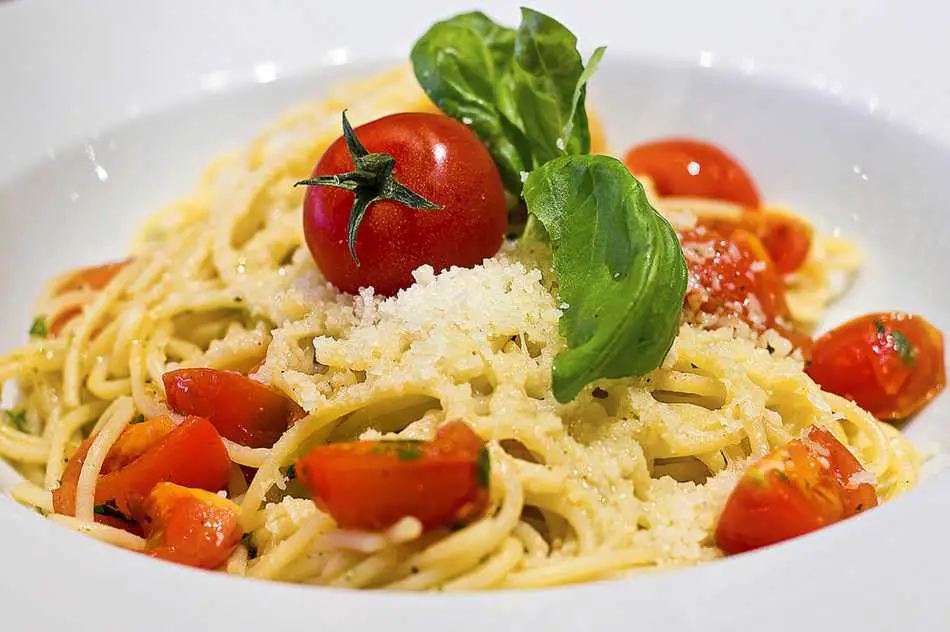There’s nothing quite like fresh, homemade spaghetti sauce, especially when it’s an old family recipe. However, some traditions belong in the past, like leaving out the sauce to cool. Not only can you put warm or hot spaghetti sauce in the fridge, but you should. There’s an old and persistent myth that hot food will spoil in the refrigerator. While it’s true that it will temporarily raise the temp inside your icebox, that is something modern appliances can handle easily. More importantly, leaving any food out for more than two hours is only good for increasing bacterial growth risk. No one wants food poisoning. It’s miserable. Keep the old world recipe, but make sure you put away the finished product before it becomes a risk to your health. I’ll walk you through what you need to know about refrigerating tomato sauce and other vital refrigeration issues, so you stay safe and healthy.
Can you put hot spaghetti sauce in the fridge? You cannot put hot spaghetti sauce in the fridge. However, it would be best to promptly place room temperature spaghetti sauce in airtight containers in the refrigerator. Sadly, the longer you leave food out, the higher the chance of bacterial growth. It is vital to store food at the proper temperature to avoid food poisoning.
How Long Can You Refrigerate Cooked Spaghetti Sauce
Homemade pasta sauce is the best. Luckily, you can make a big batch of your favorite spaghetti sauce and store it in the fridge. However, there are limits to how long un-canned sauces last, no matter how good they are.
Once you have your perfect sauce, it’s best if you store it in an airless container once the sauce has cooled. However, you can transfer it to the fridge. Put down a towel or potholder to keep the warm pot off the cold shelves for safety. No one wants shattered glass in the refrigerator.
According to Still Tasty, “Properly stored, homemade pasta sauce will last for 3 to 4 days in the refrigerator.” If you plan to store your sauce longer, then you will have to use a different method. Canning and freezing are both great ways to keep your homemade spaghetti sauce longer. In fact, it will last months if you use one of these methods.
A Nuvantee Pasta Maker from Amazon has seven different thickness settings for perfect pasta every time. The chrome-plated carbon steel looks classy in every kitchen, and interchangeable cutters allow you to get exactly the style you want for any meal. Plus, the heat-treated gears ensure a long working life. Learn more by clicking here.
Can You Put Warm Food In The Fridge
There is a persistent and dangerous myth that says you can’t put warm food in the fridge. You can put hot or at least warm spaghetti sauce and every other warm food into the refrigerator. Just as being cold doesn’t give you a cold, this myth has been busted.
If the food is too hot, then it’s not safe to place the container in your fridge. Not only can the heat shatter the glass shelves, but it will heat the food around it as well. Warming other pre-cooled foods will give bacteria a chance to grow.
Salmonella bacteria thrive in warmer conditions. Sadly, it doesn’t need to be very much warmer to make a good home for this invisible danger. A fridge is cool enough to prevent freezing and most bacterial growth, but only just.
Moreover, heating the inside of your fridge is wasteful. The warmth causes your appliance to work harder, thus wasting energy. Your power bill isn’t the only concern here. By adding stress to the machine, you are also shortening its working life.
Proper Hot to Cold Food Storage
To store your spaghetti sauce or other food properly, first, bring it down to room temperature. That means cooling it to 20–22 °C or 68–72 °F. Once your sauce or other hot dish is within this range, stick it in a well-sealed, airtight container and refrigerate.
Especially when dealing with food cooked in deep dishes, this can be tricky. Luckily there’s a lifehack for that. Pour the hot food into wide shallow pans to reach the desired temps in two hours or less. Aluminum baking dishes are ideal for this.
Alternatively, you can portion your food out into small containers. Since it has less mass, it will still lose heat faster than in one larger container. Best of all, you can mix and match these methods to cool your food for storage.
Can You Leave Tomato Sauce Out Overnight
Tomato sauce that sits out too long, like any other food, will spoil. Just because you can put spaghetti sauce in the fridge, it doesn’t mean you’ll always remember. What if you leave it out all night? Is it still safe to eat?
There are a couple of different answers you’ll find to this question. The first is complicated and wrong, and the second is simple science. Plenty of people will tell you that tomato sauce is acidic.
Particularly if your sauce has preservatives and is kept at room temperature, you’ll find assurances that ‘it’s fine.’ If you’re lucky, it might be. However, it’s not worth risking your health.
In reality, you should never leave spaghetti or other tomato sauces out for more than two to four hours. After this, it will cool to the USDA Danger Zone between 40°F and 140°F. This is the range wherein bacteria thrive.
Skip the possible severe illness and put your pasta sauce away. When you’ve put in all the work to make your own fresh sauce, it’s worth preserving.
Once your sauce is made, use a Gourmex Stainless Steel Manual Pasta Maker to get professional quality dinners from the comfort of home. With a removable handle and clamp, this Gourmex is easy to clean and reposition. Best of all, this pasta maker comes with a one-hundred percent lifetime guarantee. Have Amazon ship to your door when you click here.
Can You Put Hot Rice In The Fridge
Like pasta sauce, you may have heard that you can leave rice out, or you should never put it in the fridge. Just like other foods, these are common myths. To stay safe, preserve your food, and stay healthy, you should put the rice away once it’s cooked.
Uncooked rice lasts for ages. If you place it in an airtight container, your rice will retain its flavor for at least a year. Intriguingly, if you don’t mind less tasty and less healthy rice, then you can keep it for as long as two years.
Once you cook the rice, more than the texture changes. As it absorbs water and cooks, the easy to preserve dry grains no longer store the same. It’s crucial to keep your cooked rice at the proper temperature to preserve it.
You can hold your rice at a temperature above eighty-six degrees Fahrenheit. This will allow you to serve it for longer. Alternately, to stick rice in the fridge, it’s best to cool it as quickly as possible.
If you’re pre-cooking rice for future meals, rinse it in cold water after it finishes cooking. Doing this will help drop the temperature in a few moments. After that, you can place it in well-sealed containers and keep it in the fridge for four to seven days.
What Is The 4-Hour 2-Hour Rule
When you’re cooling hot spaghetti sauce to put it in the fridge, the four-hour two-hour rule can help. This easy-to-remember guide will keep you and your food safer. Still, whenever possible, you should put cooled food away before the two-hour mark anyhow.
The four-hour portion of the rule is a reminder to throw out any cooked food. After four hours at room temperature, this food can develop dangerous levels of salmonella and other bacteria. Although it’s tempting when you’ve eaten food in the past that sat out, please don’t keep things out too long.
Food that is less than two hours since cooking is fine. There’s little or no need to worry. Meanwhile, from the two to four-hour mark after cooking, you should make sure to cool and store your previously heated foods.
I recommend the CucinaPro Pasta Maker Deluxe Set from Amazon for your next saucy meal. The lasagne attachment lets you expand your meal planning. Better still, the removable clamp holds it steady anywhere you need to make food, and the cleaning brush makes quick work of any mess. Read the reviews by clicking here.
Final Thoughts
There was a time when a refrigerator was nothing more than a literal box with ice inside. Certainly, in those days, adding hot food to your melting ice was a bad plan because it could melt, resulting in a whole icebox of spoiled food. These days the refrigeration technology can handle a little hot tomato sauce.
Be careful not to place hot foods or containers directly on cold surfaces. Like those in many fridges, glass shelves are sensitive to rapid, uneven temperature changes and shatter from the pressure. Luckily, a folded-up towel is all you need to help disburse that heat slowly and evenly.
Use a shallow pan to help cool your sauce faster, like a baking dish used for roasts. By getting that pasta sauce in the fridge right away, you can save all the flavor with none of the risks.
Related Posts
why is my refrigerator door hot

